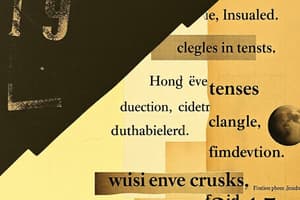Podcast
Questions and Answers
Which time expression is associated with the Present Perfect tense?
Which time expression is associated with the Present Perfect tense?
- soon
- now
- ever (correct)
- yesterday
What time expression is most commonly used with the Future Continuous tense?
What time expression is most commonly used with the Future Continuous tense?
- last week
- at this time tomorrow (correct)
- by the time
- all day
Which time expression best fits the Simple Past tense?
Which time expression best fits the Simple Past tense?
- currently
- for three years
- an hour ago (correct)
- recently
Identify the correct time expression associated with Present Continuous tense.
Identify the correct time expression associated with Present Continuous tense.
Which option is a time expression used with Past Perfect Continuous tense?
Which option is a time expression used with Past Perfect Continuous tense?
What time expression is NOT typically used with Future Perfect tense?
What time expression is NOT typically used with Future Perfect tense?
Select the time expression that aligns with the Present Perfect Continuous tense.
Select the time expression that aligns with the Present Perfect Continuous tense.
Which of the following time expressions indicates a Simple Future tense action?
Which of the following time expressions indicates a Simple Future tense action?
What is the time expression suited for the Past Continuous tense?
What is the time expression suited for the Past Continuous tense?
Identify the time expression that cannot be used with Present Perfect tense.
Identify the time expression that cannot be used with Present Perfect tense.
Flashcards are hidden until you start studying
Study Notes
Present Tense
- Simple Present: Indicates routine actions or general truths.
- Time expressions: always, usually, often, sometimes, never.
- Present Continuous: Describes actions currently happening.
- Time expressions: now, right now, at the moment, currently.
- Present Perfect: Actions that occurred at an unspecified time.
- Time expressions: ever, never, just, already, yet, since, for.
- Present Perfect Continuous: Ongoing actions that started in the past and continue to the present.
- Time expressions: for, since, all day, all week, recently.
Past Tense
- Simple Past: Actions completed at a specific time in the past.
- Time expressions: yesterday, last week, in 2010, an hour ago.
- Past Continuous: Actions that were ongoing at a certain point in the past.
- Time expressions: while, when, at that time.
- Past Perfect: Actions completed before another action in the past.
- Time expressions: before, after, by the time, already.
- Past Perfect Continuous: Ongoing actions that were happening before another past action.
- Time expressions: for, since, all day, all week before.
Future Tense
- Simple Future: Actions that will occur at a later time.
- Time expressions: tomorrow, next week, in 2025, soon.
- Future Continuous: Ongoing actions that will occur at a specific future time.
- Time expressions: at this time tomorrow, next week at this time.
- Future Perfect: Actions that will be completed before a certain future time.
- Time expressions: by, by the time, before.
- Future Perfect Continuous: Ongoing actions that will have been happening before a specific future time.
- Time expressions: for, by, for three years by next year.
General Notes
- Time expressions help indicate the specific timing of actions.
- The correct verb tense must align with the time expression used.
- Understanding time expressions enhances clarity in communication.
Present Tense
- Simple Present: Reflects routine actions or universal truths; common time expressions include always, usually, often, sometimes, and never.
- Present Continuous: Illustrates activities occurring at this moment; typical time expressions are now, right now, at the moment, and currently.
- Present Perfect: Used for actions that took place at an undefined time; includes time expressions such as ever, never, just, already, yet, since, and for.
- Present Perfect Continuous: Represents ongoing actions that began in the past and continue; time expressions like for, since, all day, all week, and recently indicate duration.
Past Tense
- Simple Past: Denotes actions that were completed at a specific past moment; time expressions include yesterday, last week, in 2010, and an hour ago.
- Past Continuous: Refers to actions in progress at a particular time in the past; often accompanied by time expressions such as while, when, and at that time.
- Past Perfect: Indicates actions completed prior to another past action; uses time expressions like before, after, by the time, and already.
- Past Perfect Continuous: Illustrates ongoing actions occurring before another past event; includes expressions such as for, since, all day, and all week before.
Future Tense
- Simple Future: Identifies actions anticipated to happen in the future; frequent time expressions are tomorrow, next week, in 2025, and soon.
- Future Continuous: Describes actions that will be in progress at a specified future moment; commonly uses time expressions like at this time tomorrow and next week at this time.
- Future Perfect: Refers to actions expected to be completed before a future timeframe; utilizes expressions such as by, by the time, and before.
- Future Perfect Continuous: Highlights ongoing actions projected to occur before a designated future moment; uses time expressions like for, by, and for three years by next year.
General Notes
- Time expressions play a crucial role in defining the specific timing of actions within each tense.
- Ensuring the correct verb tense correlates with the associated time expression enhances grammatical accuracy.
- Mastery of time expressions improves clarity and effectiveness in communication.
Studying That Suits You
Use AI to generate personalized quizzes and flashcards to suit your learning preferences.




